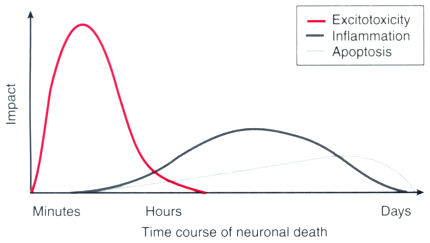Figure 21-17
Time course of neuronal death. Excitotoxic (glutamate-mediated)
injury results in neuronal death within the first few hours after the onset of ischemia.
Brain tissue injury elicits an inflammatory response, an important process in removal
of injured tissue and healing, that leads to a substantial amount of collateral damage.
Inflammation-mediated neuronal death can continue for several days. Neuronal apoptosis
can occur in injured neurons that survived the initial insult. Apoptotic neuronal
death has been demonstrated to occur for many days after the initiating ischemic
insult. It is now apparent that ischemic neuronal death is a dynamic process in
which neurons continue to die for a long period. (Adapted from Dirnagl U,
Iadecola, C, Moskowitz MA: Pathobiology of ischaemic stroke: An integrated view.
Trends Neurosci 22:391–397, 1999.)

